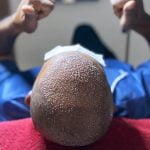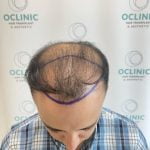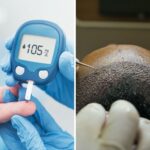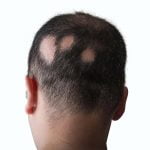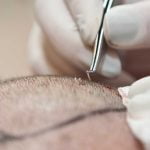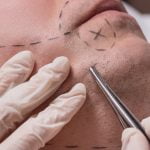Contents
ToggleWhat is Ringworm?
Alopecia areata, also known as alopecia, is a hair loss caused by the loss of hair follicles. This disease is an autoimmune disease. The person’s hair starts to fall out with the effect of the immune system when the disease is caught.
Hair follicles are directly affected by the disease. Since it changes the external appearance of the person, people are psychologically demoralized too. Ringworm or alopecia areata is a disease that has a cure.
Hair transplantation treatment allows you to regain your lost hair permanently and have healthy, bushy hair.
Ringworm Disease and Hair Loss
Ringworm disease, as the name suggests, causes severe hair loss. Loss of hair follicles leads to hair loss.
People who are more affected by hair loss are those under the age of twenty. However, this disease is also seen in the elderly and children. The appearance of ringworm disease on the head of the person is understood by forming an oval shape in a certain area. Another appearance occurs when it takes the form of an exclamation point.
Sometimes the hair can grow back from the places where the hair loss occurred. Sometimes, hair starts to fall out from different areas.
Causes of Ringworm Disease
Ringworm disease occurs when there is a problem in the immune system of the person’s body. As a result of this problem, the hair falls out, sometimes it grows back. It may vary from person to person.
Is Ringworm Hereditary?
When ringworm or alopecia areata disease is investigated, a hereditary history has been found to affect the person. However, since some genetic and environmental factors have been found to be involved, the inheritance pattern cannot be known clearly.
First-degree relatives, such as siblings and children, are at higher risk of developing ringworm.
Types of Ringworm
There are types of alopecia areata or ringworm. For the treatment of the disease, it is necessary to know which species it belongs to. After species identification, a treatment method is sought.
Alopecia areata affects areas such as eyebrows, eyelashes and beards, where there is usually hair on the body. Oval or round spills are experienced. The types of ringworm are as follows:
- Irregular Alopecia Areata
- Diffuse Alopecia Areata
- Alopecia Totals
- Alopecia Barba
- Ophiasis Alopecia
- Alopecia Universalis
How Is Ringworm Disease Diagnosed?
When diagnosing ringworm disease, dermatologists make the diagnosis by examining
according to the amount of hair loss and hair sample. If there are other factors that
cause hair loss, your doctor may request a scalp biopsy to examine them as well.
A blood test may also be ordered for diagnosis. One or more abnormal antibodies are
tested in the laboratory. If the person has these antibodies, it probably indicates an
autoimmune disorder. Other tests used to diagnose ringworm are as follows:
- Iron level test
- Antibody test
- C-reactive protein and erythrocyte sedimentation rate
- thyroid hormones
- follicle stimulating and luteinizing hormone
- Free and total testosterone
When Should You Go to the Doctor for Ringworm?
You should go to a dermatologist when excessive shedding occurs in any of your areas such as hair, eyebrows, eyelashes, beard. Going as soon as you notice it without going too far will allow you to start treatment much faster.
If the cause of hair loss is ringworm, your doctor will let you learn about the type of ringworm. It also helps in guiding the right way for treatment. It is very important for the health of the problematic area that you consult a good doctor in the field.
If you experience shedding again after ringworm treatment, you should definitely consult your doctor and act on their recommendations. You should have more advanced tests for your disease and examine different treatment options.
What are the Symptoms of Ringworm and Beard?
The symptoms of hair loss and beard loss are as follows:
It usually begins to form in the colder months. The first affected area is often the scalp.
The skin of the affected area is very healthy.
After the scalp is affected, over time, all kinds of scalp, including eyelashes, eyebrows, beards, armpits and even pubic hair, may be affected by this disease and begin to shed.
- Hair loss in the head area of the person is round or elliptical.
- In some parts of the beard, as in hair loss, round spots and gaps may occur with spills.
- Nail structure can sometimes change. The person’s nail appearance may be either too soft or too hard.
- The effects of the disease vary from person to person. Sometimes it recurs chronically, sometimes hair or beard grows back after a while in spilled areas.
- If hair grows back in the bald area, it usually comes out white at first.
Before and After Beard and Mustache Transplantation
How to Prevent Ringworm?
To prevent ringworm, you can follow some care recommendations. Don’t forget antioxidant supplements when taking supplements. In particular, these supplements reduce inflammation in your body. These supplements are as follows:
- Omega-3
- Vitamin A
- Vitamins C and E
In addition, it is recommended to take vitamins B12, B1, and B6 as additional supplements to directly affect the brain and reduce your stress. Vitamin B5 supports new hair growth.
Vitamin D deficiency may also be involved in the proliferation of inflammations. Therefore, it is recommended to take vitamin D as needed. Vitamin D helps the absorption of calcium and strengthens the immune system by regulating hormones.
You should take all the aforementioned vitamins in the appropriate amount as a result of the tests your doctor will do for you.
How is the Treatment of Ringworm “Alopecia Areata”?
Different treatment methods are applied for ringworm or alopecia areata. When you have a ringworm treatment, choosing the hair transplant method instead of other methods will give more permanent results. However, if you are going to have a hair transplant or another treatment method, you should not decide on the treatment quickly.
In the treatment of ringworm, the dermatologist recommends the treatment according to the level of your disease or postpones the treatment by understanding that your hair will grow back after shedding. It will be the best decision to start a treatment according to the person’s condition.
After determining the type of ringworm disease, your doctor will recommend a treatment method according to the type and level of progression of your disease. You should also research the method he recommends thoroughly. Regardless of the method, you should consult with several different specialists and talk to patients who have had the same treatment.
When you have a wrong method applied or choose a wrong doctor, you will not get positive results and you will suffer financial damage. On the contrary, you may sensitize the area affected by ringworm disease and cause negative results. Your psyche will also be affected worse. Therefore, it is necessary to act cautiously and conduct a detailed research.
People who have lost their hair often prefer hair transplantation treatment for ringworm disease. The natural and definitive solution for ringworm disease is hair transplantation. This method shows permanent results in most patients.
If you have a ringworm-like condition, you should consult a skin specialist as soon as possible. You should not delay the examination. Early diagnosis allows you to act consciously for the progression of your disease.
Curious About Ringworm
Contagiousness: Another frequently asked question about ringworm is “Is ringworm contagious?” is the question. No, ringworm disease is not contagious. It usually occurs due to weak immune system or genetic reasons.
Ringworm in Women: Ringworm is not just a male disease. Of course, it is also seen in women. It has been found that it is more common in males than females.


